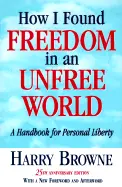
How I Found Freedom in an Unfree World - by Harry Browne
ISBN: 0965603679Date read: 2016-01-03
How strongly I recommend it: 3/10
(See my list of 430+ books, for more.)
Go to the Amazon page for details and reviews.
Some fun "fist in the air" thoughts on freedom, from 1973. Includes related thoughts on parenting and honesty.
my notes
Freedom is the opportunity to live your life as you want to live it.
For most people, freedom is an “if only.” “If only it hadn’t been for my wife…”
Unhappiness is an involuntary feeling of discomfort as you react to things that don’t suit your nature.
There would have to be a selfish person who would receive, accept, and enjoy the benefits of our unselfishness for there to be any point to it. But that selfish person (the object of our generosity) would be living by lower standards than we do.
Popular misconceptions about the nature of government:
1. The belief that governments perform socially useful functions that deserve your support.
2. The belief that you have a duty to obey laws.
3. The belief that the government can be counted upon to carry out a social reform you favor.
4. The fear that the government is so powerful that it can prevent you from being free.
Markets provide the only way to know exactly what individuals really want. Only when an individual gives up something he has in an exchange can you know how much he values the thing he says he desires.
No one owes me moral conduct, respect, friendship, love, courtesy, or intelligence.
Be involved with people who want to do the very things I want them to do.
There are times when you feel that your rights are the only weapon you have in a dispute. If so, it usually indicates that you’ve made yourself vulnerable to someone whose self-interest conflicts with yours. It helps to remember that you are the one who put yourself in the vulnerable position. You have chosen to associate with those who cause you problems.
If I concentrate on the thief’s immorality or on my rights, I’m probably leaving myself vulnerable to another theft. But if I use what I control to make new arrangements, I can see to it that the theft isn’t repeated.
The sooner you pay a price, the less it costs you.
The sooner you handle it, the easier it is.
Don’t confront the government. Don’t organize. Don’t get a large group of people together.
There are plenty of people who do the same things that teachers, doctors, architects, lawyers, beauticians, engineers, bankers, investment counselors, and psychiatrists do, but avoid all the legal requirements by not using the legal titles.
The child should have his own world where he is clearly the sovereign. That means a room of his own that is subject to his control alone. If he’s forced to keep it as his parents wish, he’ll never discover for himself the consequences of alternative courses of action. He should also have other property to use in whatever way he chooses. Property isn’t owned if it can be used only in “approved” ways. Once he receives something, it’s important that he learn to understand what it means to own something and be responsible for its preservation. He shouldn’t be taught to expect automatic replacement of any property he might destroy.
They first want him to believe that Santa Claus loves and rewards him and then later want him to understand that it’s the parents who love him.
It would make a considerable difference if the child were never taught anything that you intend to reverse later.
He lives in a world in which his future will be of his own making, encourage that by letting him deal directly with the world as much as possible.
Dishonesty usually comes about as an attempt to avoid prices. It’s the hope of being able to do something without the consequences that would naturally follow — the reactions of certain people.